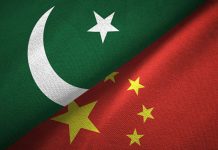DM Monitoring
CHANGCHUN: Stretching around 1.5 km in the city of Changchun, capital of northeast China’s Jilin Province, the once deserted Caizhi Street is now a vibrant crowd-puller, thanks to the emergence of numerous German eateries in recent years.
German restaurants and beer gardens located in there are an unmissable sight. The aroma of crispy and tender Schweinshaxe and brew permeating the air make the street a popular spot not just among locals but also German expats who might be feeling homesick. Luscious exotic cuisines and beer culture have added to the destination’s fame.
“The roast pork knuckles here are even better than those in my hometown, and everything here makes me feel at home,” said Klaus Rolfs, a 69-year-old German expat who works for an auto mould manufacturer in the city. Coming from Mindleheim, a town in Bavaria, Wilhelm Reif fell in love with Changchun at first sight when he arrived in the city in 1995 to work as the technical manager at Siemens Vdo Automotive Ltd.
Initially, it was not easy for Reif to adapt to the local food and he planned to bake German bread as a part-time job. In 2008, he finally opened a restaurant named Die Backstube on Caizhi Street. It was one of the very first German restaurants in the city, offering authentic German food and beer. Next to Reif’s restaurant is a German beer hall owned by Ye Lihong, who is Chinese. Her beer hall, one of the earliest German beer agents in Changchun, serves traditional German food. She learned to prepare these delicacies from her German brother-in-law.
The close relationship between the northeast Chinese city and the European country stemmed from their close cooperation in the automobile industry. Changchun is dubbed China’s “Auto City” due to the location of FAW Group, which later joined hands with Volkswagen Group and established the joint venture FAW-Volkswagen in 1991. The move has brought a steady stream of German experts, technicians, as well as other practitioners from Germany to Changchun.
Consequently, more and more German elements have emerged in the city over the past three decades, ranging from retail giant Metro to a wide and diverse variety of domestic appliances.





